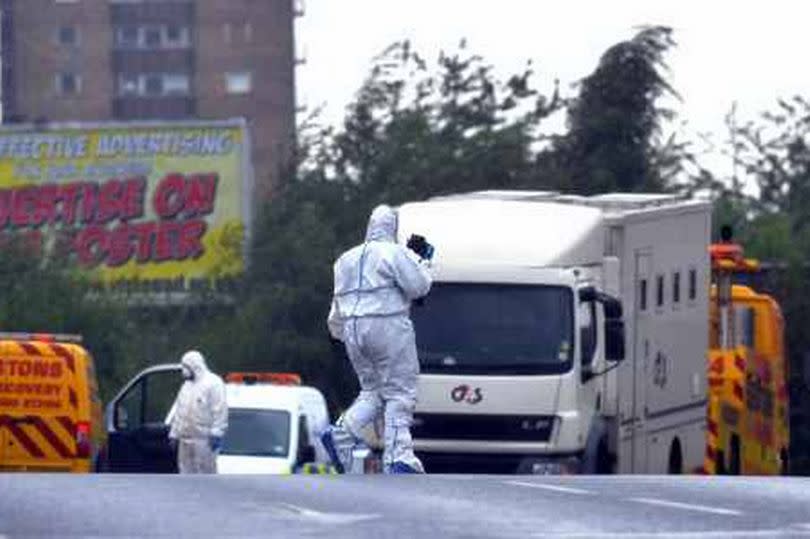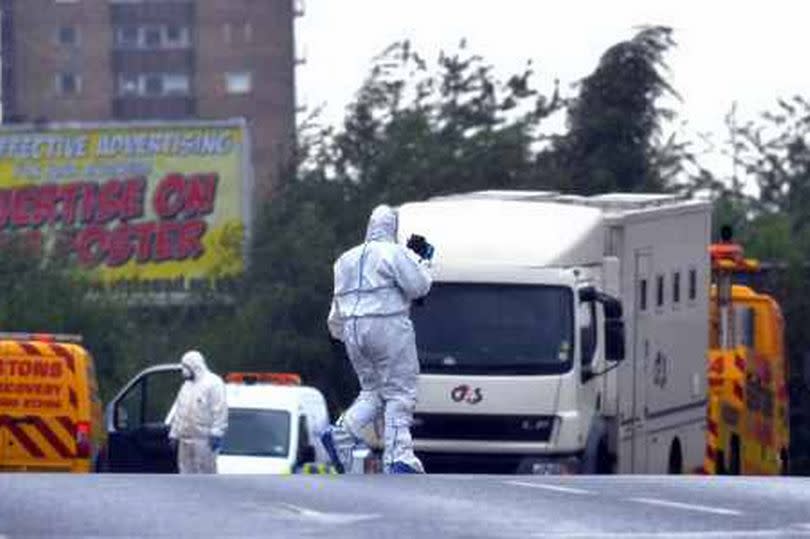Two gangsters went from “blood brothers” who broke out of a prison van together to sworn enemies as their underworld bond disintegrated.
Kirk Bradley and Tony Downes were once “thick as thieves” but their friendship ended in a prison knife attack after their criminal exploits turned them against each other. The pair specialised in contract violence and were paid by the Huyton Firm – a Liverpool crime gang – to carry out a terror campaign across Merseyside.
Bradley, known as ‘The Turk’, and Downes, who went by the name ‘Fat Cat’, once busted out of a prison van and escaped to Amsterdam. But after living the high life in Amsterdam, a multi-force operation led to their eventual arrest and they were hauled back to the UK to face justice.
READ NEXT: Busy road closed with people urged to ‘avoid area’ as fire crews respond to incident
At the height of their criminality, Bradley and Downes were reliable and terrifying enforcers, involved in a wave of shooting and grenade attacks across Merseyside. The Liverpool Echo has reported how the due earned a fearsome underworld reputation and then saw their crime empire come crashing down.
Cleared in court of mum’s murder
In 2005, Lucy Hargreaves – a 22-year-old mum – was shot dead as she slept on the sofa of her home in Walton, Liverpool, when three masked men burst in. She was blasted three times with a shotgun, before her house was doused in petrol and set alight. The attack was believed to have been orchestrated following an incident in the early 1990s.
Ms Hargreaves’ partner Gary Campbell was just a teenager when he was a passenger in a car driven by joyriders which hit a group of people. Kevin Downes – Tony’s three-year-old brother – was hit and killed by the car. Mr Campbell later maintained he was the target of the attack.
Both Downes and Bradley, who were teenagers but already had reputations in the criminal underworld, were charged with Ms Hargreaves’ murder. But the two men walked free from court after the judge found they had no case to answer. Sarah Chapman, who was the Echo’s crown court reporter at the time, said the pair “whooped and hollered” as they were cleared of involvement.
She added: “The lifestyles they had led had made them think they were untouchable. And quite hard, invincible guys.” Former Merseyside Police detective Ian Mulcahey said: “The family were devastated and felt let down. I was astonished by the decision. But we had to accept the verdict of the court.”
The prime suspect in the shooting, Kevin Parle, who is also a suspect in the murder of teenager Liam Kelly in 2004, remains on the run. Downes, who was friends with Parle, would later write a taunting letter to former police detective Peter Bleksley who has dedicated considerable time to tracking down the wanted man.
Grenade and gun gang for hire
Downes and Bradley were later paid by drug lords from Stockbridge Village to target anyone who antagonised them. Another gang led by Vincent Coggins paid for the pair’s operation to carry out a terror campaign after they objected to a sensitive trial going ahead at Liverpool Crown Court.
The pair were tasked with targeting individuals the Huyton Firm blamed for the trial proceeding. Hand grenades were thrown at family homes, and rivals were kidnapped and shot. The gang was responsible for 20 separate incidents across Merseyside, which included seven grenade incidents. On one occasion a grenade was accidentally left outside the Birkdale home of Kenny Dalglish.
The “blood brothers” presided over a guns-for-hire gang which executed contract violence for cash. Rivals were kneecapped, kidnapped and family homes blown up with hand grenades. In one shocking incident, the gang threw grenades into a room where a gran was babysitting a seven-year-old boy. Other victims suffered life changing injuries after being shot.

Downes, described as the gang’s chief executive, was accused of directing much of the violence from his cell at Liverpool’s Walton jail. Their associates, Gary Wilson, Craig Riley and Joseph Farrell, were given ‘jobs’ to carry out and would delegate some tasks out to younger crooks who wanted to make a name for themselves.
The gang’s spree, which saw at least 20 separate attacks over two years, was only stopped by a covert operation by Merseyside police’s Matrix unit that involved help from the authorities in Holland, who recorded damning phone calls between the conspirators. Several guns, including an Uzi with a silencer attached, were taken off the streets as part of the police operation that captured the gang.
Prison break
Downes and Bradley escaped from a G4S security van bound for Liverpool Crown Court, which led to the collapse of a high profile trial. Just after 8.30am on the morning of July 18, 2011, a gang of masked men, armed with a sledgehammer and a gun, ambushed the G4S van containing Downes and Bradley on Trinity Way, Salford.
The raid took place during rush-hour traffic in front of passing motorists and one of the guards was beaten in the street while a gang member shouted at the driver: “Get the f***ing keys out or I will blow your f***ing head off.” The gang fled in a Saab, which was found abandoned about a mile away in Barrow Street, Salford. It is believed Manchester criminals carried out the high risk operation.
Downes organised the escape plot from his cell at Strangeways prison with a mobile phone which had been secreted in his body. Prison bosses knew Downes had the phone, despite the fact he was suspected of using a phone to organise a city gang war from his Walton jail cell.
Speaking at the time, the prison service said escapes of this type were “rare” and that they would be launching an investigation to “identify any weaknesses in procedure and to learn lessons”. The pair fled to Holland but were later tracked down and brought back to the UK to face justice. Downes was arrested in a car near the Belgium border and Bradley was apprehended a couple of months later in an executive apartment.
Bradley, who was 26 at the time of his capture, was sitting in his shorts and flip-flops watching TV and smoking a joint in the 2,500 euro-a-month penthouse apartment in Bijlmer when an armed SWAT team burst through the front door in April 2012.

The Serious Organised Crime Agency’s (SOCA) top man said at the time of Bradley’s capture: “He had no idea we were on to him.” In March 2012, Downes and Bradley were jailed for life with a minimum of 22 years after being convicted in their absence of conspiracy to possess firearms with intent to endanger life and conspiracy to cause damage with intent to endanger life.
Their associates Wilson, Riley and Farrell all entered guilty pleas, admitting possessing firearms and causing criminal damage with intent to endanger life and were jailed for life. They were jailed for a minimum of 16 years; 14 years and 12 years respectively. Although the pair were brought back to serve their life sentences, those who broke them out of the prison van have never been brought to justice.
Brothers become enemies
The pair were reported to have rowed furiously in the street when the armed Manchester gang smashed them out of their prison van. Months on the run did little to cool any tensions between them. It’s understood that once the pair were returned to prison ahead of their trial, they fell out further.
The descent reached a point where Downes even slashed Bradley with a homemade knife while they were in the high security unit at London’s Belmarsh prison. Highly-trained prison officers managed to intervene and prevent Bradley suffering a serious injury although Bradley did sustain a knife wound.
The Ministry of Justice confirmed a knife attack took place and it was understood that Downes, who was 26 at the time of the incident, was disciplined by the authorities. But the damage was done – and the duo who were once described as “thick as thieves pals” are now believed to be clear enemies.
Despite their fallings out, the pair tried to appeal against their sentences. But their appeals, along with two other members of their gang, were rejected because of their “extreme form of gangland warfare” and “ruthless and calculated violence”.
One of the judge’s told them: “The object was punishment and terror in which innocent members of the public were sometimes caught up. It was highly dangerous, it was hugely criminal in nature. The attacks were ruthlessly and persistently carried out. They were intended to endanger life and, in our judgement, carried them out with a substantial risk of death occurring.”
EMEA Tribune is not involved in this news article, it is taken from our partners and or from the News Agencies. Copyright and Credit go to the News Agencies, email news@emeatribune.com Follow our WhatsApp verified Channel





